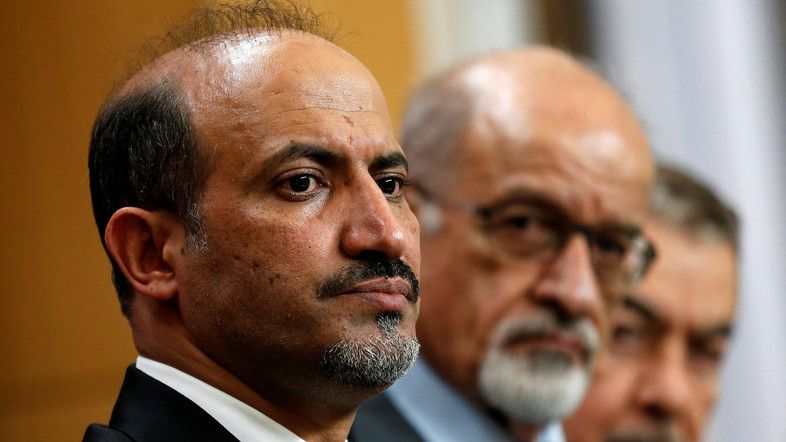Syrian peace talks in doubt after UN invites Iran
BEIRUT — Syria’s main, Western-backed opposition threatened on Monday to sit out a peace conference this week aimed at ending the country’s crippling civil war, criticizing the last-minute decision to invite Iran and throwing months of diplomatic maneuvering into question.
The invitation to Tehran from Secretary-General Ban Ki-Moon came after the U.N. chief said he had received assurances from Iran that it accepted the premise of the talks — to establish a transitional government for Syria, which has been led by the Assad dynasty since 1970.
The peace talks are intended to bring together for the first time representatives of President Bashar Assad’s government and members of the Western-backed opposition that is trying to overthrow him.
Diplomats and political leaders acknowledge that a quick end is unlikely for a conflict that has killed more than 130,000 people and touched off the worst humanitarian crisis in decades. The battle lines have been largely frozen since early 2013, and the opposition Syrian National Coalition has little sway or respect within Syria’s rebellion.
But the U.N.-hosted peace talks in Geneva and Montreux this week had raised hopes of at least getting the two sides to talk — expectations that were called into question on Monday.
Ahmad Ramadan, a senior member of the Syrian National Coalition, said the opposition is “suspending” its participation because an invitation was extended to Iran.
Ban said he had issued the invitation to Iran after “speaking at length in recent days” with Iranian Foreign Minister Javid Zarif, who had “pledged that Iran would play a positive and constructive role in Montreux.”
The aim of the conference, dubbed Geneva 2, is to agree on a roadmap for Syria based on one adopted by the U.S., Russia and other major powers in June 2012. That plan includes the creation of a transitional government and eventual elections.
Iran is Assad’s strongest regional ally, offering billions of dollars in credit since the crisis began in March 2011. The United States, Saudi Arabia and several countries in the Persian Gulf suspect Tehran is also shipping him weapons.
Invitations to the one-day meeting of foreign ministers at a Montreux hotel had been subject to approval by the initiating states, Russia and the United States, but the two countries had been at an impasse over Iran.
State Department spokeswoman Jen Psaki said Iran must agree to the road map adopted by the U.S., Russia and other major powers in Geneva in June 2012, calling for the creation of a transitional Syrian government with full executive powers.
She said the U.N. invitation “must be rescinded” if Iran does not fully and publicly accept that plan. France’s Foreign Ministry on Monday also called on Iran to accept the 2012 road map “openly.”
In Moscow, Foreign Minister Sergey Lavrov said he welcomes Iran’s presence in the talks. Lavrov, whose country is a main international supporter of Assad, added that “around 40 states have been invited to the conference … If Iran is absent from that list, it (the conference) will look like a profanation.”
Ramadan, speaking by phone from Istanbul, said the opposition has said before that attending a peace conference that includes Iran was out of the question.
“We consider Iran a country that is invading Syria and sending militias, whether it’s Revolutionary Guards or Hezbollah,” he said.
“If the situation does not change, the Coalition will not be” at the talks this week, Ramadan added.
The U.N. decision to invite Iran “was like a shock for all of us,” said another Istanbul-based Coalition member, Hisham Marwah. He also stressed the Coalition will “not attend Geneva 2 unless this invitation” is rescinded.
Despite those remarks, it remained unclear how definite the pullout by Syrian opposition members was or whether they might be persuaded to change their minds.
The Coalition, under huge pressure from its Western and Arab supporters, had agreed late Saturday to attend the Geneva peace talks.
“The coalition made its decision on the premise that Iran will not be present in Geneva,” Ramadan said,. He suggested that inviting Iran was akin to attempting to “blow up the Geneva talks from the inside.”
In 2012, the chief commander of Iran’s powerful Revolutionary Guard, Gen. Mohammad Ali Jafari, said the unit had high-level advisers in Syria but denied it has fighters there. More recently, however, analysts say that Iranian troops and commanders have taken on a more direct role in the conflict.
Lebanon’s Iran-backed Hezbollah fighters openly joined the war in Syria last year fighting along with Assad’s forces.
enquirerherald


